Advertisement
75 Years After The Women's Pro League, Bringing Baseball Back To Girls
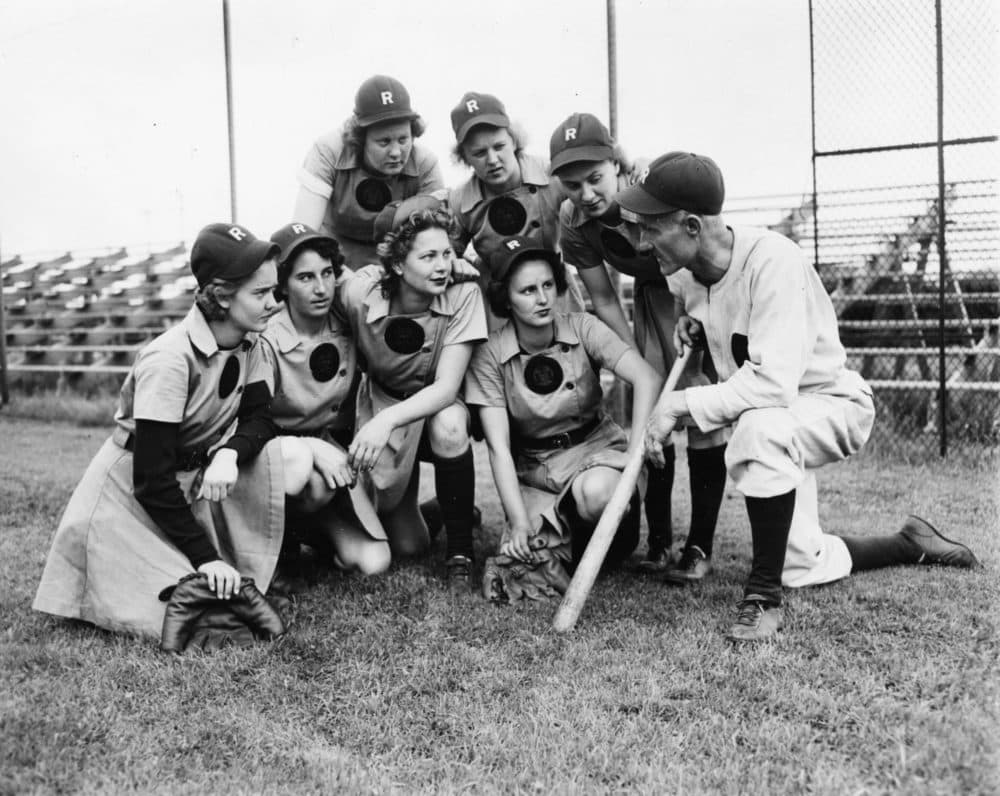
Kat Williams loves baseball. Not softball. Baseball.
"I guess maybe one way to explain it is by talking about when I first saw the movie 'A League Of Their Own,' if that's OK," Kat says. "I’m going back a bit, but it is relevant."
Baseball has always been important to Kat. She grew up poor. She had a learning disability that wasn’t diagnosed until well into adulthood. She says school was tough.
"But when I was on a baseball field, I was good," Kat says. "And so there was only one place I was comfortable. And that was shortstop."
Kat says baseball saved her.
"Literally, without it, I wouldn’t be here," Kat says. "I needed that place where I was OK."
When she was in third grade, Kat remembers her teacher asking her classmates what they wanted to be when they grew up.
"People were saying, ‘Oh, you know, I want to be a fireman,’ ‘I want to be a nurse,’ or a doctor, or whatever," Kat says. "And so she said to me, ‘What about you?’ And I said, ‘I want to play shortstop for the Cincinnati Reds.’ Well, of course, the entire class burst into laughter. Including the teacher. And I was mortified."
Kat wasn’t embarrassed for herself. She was embarrassed for her teacher and classmates. After all, she was a really good shortstop — and the Reds were, in her estimation, the best team. Why wouldn’t she play for them?
Over the following years — and decades — Kat found out why. Growing up before Title IX, there just weren’t opportunities for her to play baseball.
Advertisement
'A League Of Their Own'
So, fast forward to 1992, and Kat is sitting in a movie theater watching Geena Davis and Rosie O’Donnell and Madonna playing baseball — for money. The movie was set in the year 1943.
"I was stunned," Kat says. "I was like, ‘Is this real? What — what? What is this?’ And so, I watched it. And I laughed. And I cried. And at the end of it, Madonna starts to sing ‘This Used To Be My Playground.’ And I just — it is still a very emotional memory for me. And I sat there in that theater, and I thought, ‘Oh, my god.’ "
Kat thought the movie couldn’t possibly be based on real life. There had never been a women’s professional baseball league. Right?
But as Madonna sang and the credits rolled, footage of actors was replaced by real players from the All-American Girls Professional Baseball League — then in their 60s and 70s — playing a reunion game at Doubleday Field in Cooperstown.
"Madonna kept singing, and the credits kept rolling, and I kept sitting there," Kat says. "And then more credits kept rolling, and I kept sitting there. And I couldn’t get up. I could not leave. Because I knew, if I left, that it wasn’t going to be real.
"Finally, the lights came up, and the guys came in to pick up the garbage off the floor. And I looked around, and there were about 20 women sitting in the theater. And none of us could move. None of us could leave. I was angry. I was sad. I was blindsided. Nobody told me that history. Nobody told me I wasn’t the only one."
Since that day when she sat in stunned silence while Madonna sang and sang and sang, Kat Williams has studied the history of women in sports. She became a history professor at Marshall University in West Virginia.
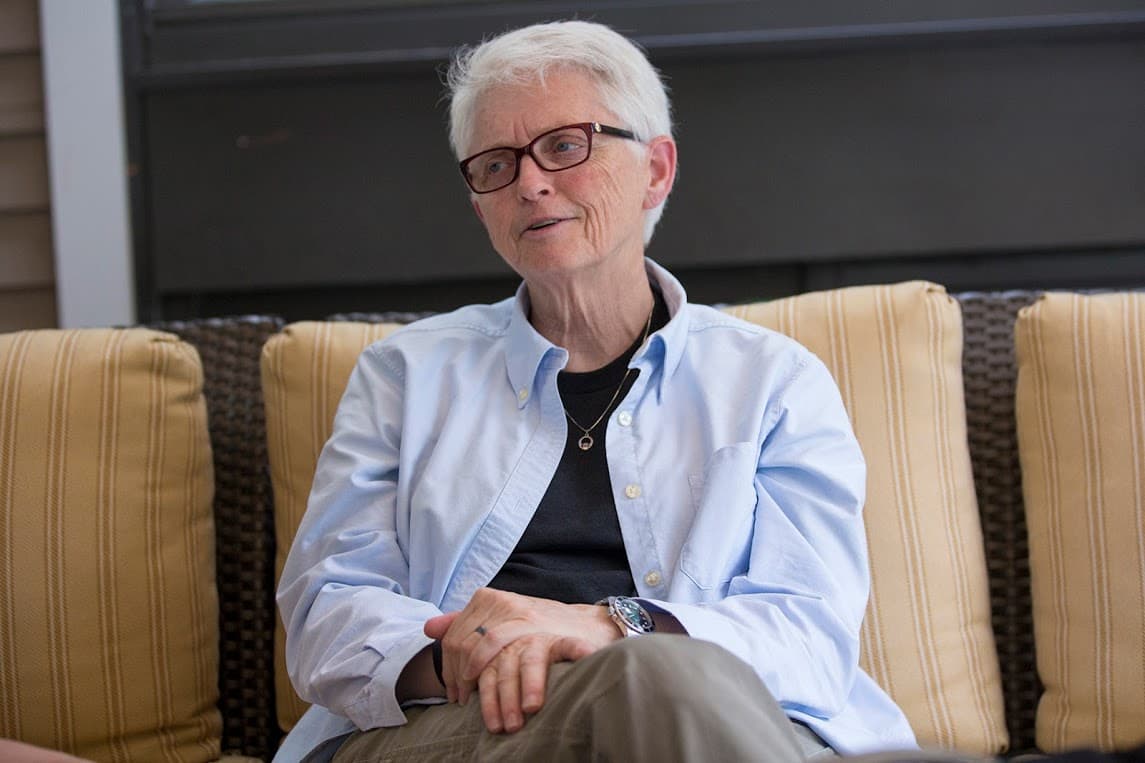
And Kat has gotten to meet many of the women who actually played in the All-American League. Women like Shirley Burkovich:
"My dad used to take me down to the ball game," Shirley says. "And, you know, watch the first baseman. See how he plays."
And Maybelle Blair:
"I think my mom's breast was half baseballs," Maybelle says. "I’m not for sure."
Maybelle is 91. Shirley’s 85. And they’re the perfect mismatched pair: Shirley grew up in a suburb outside Pittsburgh. She’s quiet and shy, but sweet — she gets tears in her eyes when she talks about what the game means to her.
Maybelle is loud and opinionated. She wears oversized sunglasses and walks with a cane made from a Louisville Slugger. But the women tell similar stories.
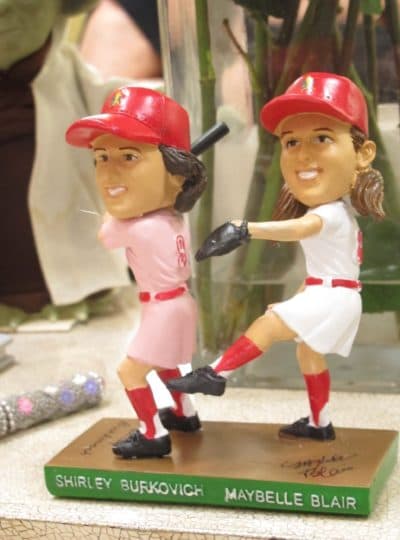
Maybelle Blair And Shirley Burkovich
"When all the boys in the neighborhood would get out and have batting practice and needed someone to chase the balls, then I got to play," Maybelle says. "I thought I was having a wonderful time. Come to think of it, I was."
"I remember the neighbors telling my mom, ‘Why do you let your daughter play with the boys all the time?’ " Shirley says. "And she said, ‘There's no girls' teams.’ "
"My brother used to have a little uniform that my mother bought him," Maybelle says. "And when he would leave the house, I would priss around the house in that uniform. She’d be looking out the window. Because he’d have a fit if he ever caught me in that uniform. She’d be like, ‘Maybelle, here he comes.’ "
Maybelle never thought she'd have a uniform of her own. "Never. Never, never, never," she says. "But I did."
"There was an article in the newspaper," Shirley says. "And I didn’t see it, but my brother did. And he says, ‘Why don’t you go try out?’ I thought, ‘Oh, my god, I’d be too scared to go down there and try out.’ "
"Well, I was out playing softball," Maybelle recalls. "And this guy came up to me and says, ‘Hey, I want you to go play professional baseball.’ I said, ‘Well, there isn’t any that I know of,’ you know. He says, ‘Oh, yes, there is.’ "
"My brother took the day off of work," Shirley says. "And he says, ‘I’ll go with ya.’ He says, ‘We'll just sit in the stands.’ And I think he knew that once he got me down there, sitting in the stands, there was no way I was not going to go down there and try out."
"My mother kept shaking her head," Maybelle says. " ‘No, my daughter's not leaving this house. Come hell or high water, she's not leaving.’ Well, finally, after 30 or 40 minutes longer, he says, ‘Well, Ms. Blair, you don’t understand. We're going to pay her $65 a week.’ My mother looked over at my father and says, ‘Go crank up the old Model T. I’m packing her suitcase, and she’s outta here.’
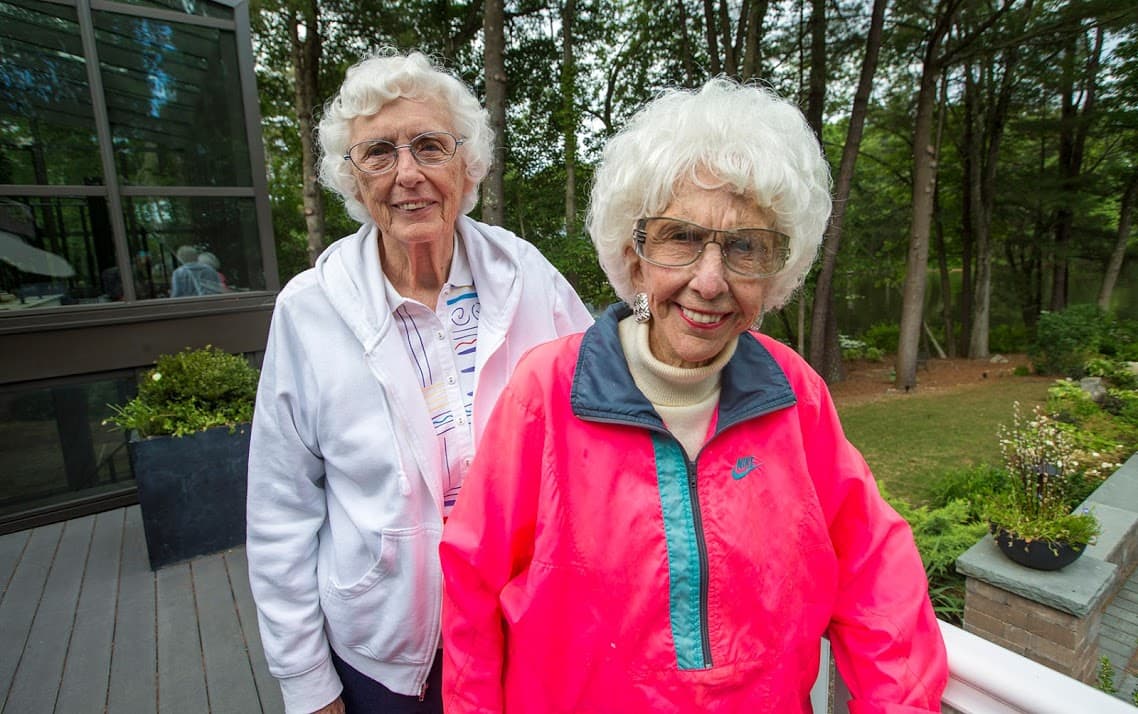
"I got $55 a week," Shirley says. "That was more than my dad was making. He worked in the steel mills. It wasn’t the money — I was just so happy, just to have the opportunity to play baseball."
"I got in that little dress," Maybelle says. "My little uniform. And then what I really enjoyed was when I got on my spikes. And I started to walk towards the field, goes, click, click, click. And I walked out, and I saw that field. And I says, ‘Oh, my god — I am going to get to play baseball.’ "
"I thought that was going to be my career," Shirley says. "16 years old: I planned for playing forever."
But Shirley only played three seasons. Maybelle just one. Shirley says, by 1950, it was clear that the end of the league was near.
"The teams were being sold — attendance was down," Shirley says. "You know, why would you want to come sit in a hard stand when you could sit on your couch and watch TV?"
"Baseball for women came to a halt," Maybelle says. "You know, we were all supposed to go home and put on our little aprons and have babies and stay home and take care of the house."
"Women didn’t walk away from baseball," Kat Williams says. "Baseball walked away from women."
'Baseball Walked Away From Women'
Kat says, after the league closed down in 1954, women kept playing whenever and wherever they could. But in the decades following the All-American League, "whenever and wherever" was usually limited to recreational leagues. And those leagues played softball — not baseball.
Softball began not as a sport for women and out-of-shape rec-league players but as a sport men could play indoors when it was too cold to play baseball outside. But baseball has always carried a subtext that has never existed for softball.
"Historically speaking, baseball is — in this country — is very much about masculinity," Kat says. "And in the 20th century — the early 20th century, particularly — it was very much about ways to create ‘the real man.’ "
And then, in 1972, something happened that would push even more women away from baseball and towards softball.
"The real divide, I think, comes about as a result of Title IX," Kat says.
Yes, Title IX, the landmark federal regulation that requires — among other things — equal opportunities for men and women in education and sports.
"I am a huge proponent of Title IX," Kat says. "In fact, I believe that Title IX is perhaps the biggest, most important piece of legislation for women since the 19th Amendment was ratified in 1920 finally giving women the right to vote. Having said all that, Title IX is one of the main reasons why we have a split between baseball and softball. There’s this idea that there had to be ‘equivalency sports.’ "
When athletic administrators interpreted the law, they didn’t see anything that required them to offer the same sports for men and women — which is where the idea of “equivalency sports” came from.
"What happened was, ‘OK, we have baseball — so what we'll do is we'll make softball for girls.’ And softball becomes ‘the girl’s sport.’ "
OK. I know what you’re thinking. There are plenty of girls who play baseball, right? I mean … who could forget 2014, and the Little League World Series.
"I watched that Little League World Series with great interest and cheered every pitch," Kat says. "But I was astounded when a couple of the announcers didn’t quite know what to say. And one of them looked at the other and said, ‘Do girls play baseball? Do girls even play baseball?’ And, you know, so that I didn’t put my head through the television, I had to leave the room. Because the people who are supposed to know don’t even know that she stands on a lot of women’s shoulders."
Girls' Baseball Today
Mo’ne Davis is 17 years old now. And she remembers the exact moment when she realized that her presence at the Little League World Series was a very big deal.
"We were in the rec room playing ping pong — and all of a sudden, I hear my name," Mo'ne says. "And it’s, like, ‘Next up on Sports Science: Mo'ne Davis.’ And I was, like, ‘What — that’s crazy.’ So we watched it. And I was, like, ‘That's so cool.’ And then all of a sudden, my phone was buzzing. And it would freeze, and I barely got text messages through. I couldn’t really call people off my phone."
Mo'ne was trending No. 1 on Twitter. Later, she won an ESPY for Best Breakout Athlete and got to meet Barack and Michelle Obama.
"They were just like, ‘Keep going, don’t stop,’ " she recalls.
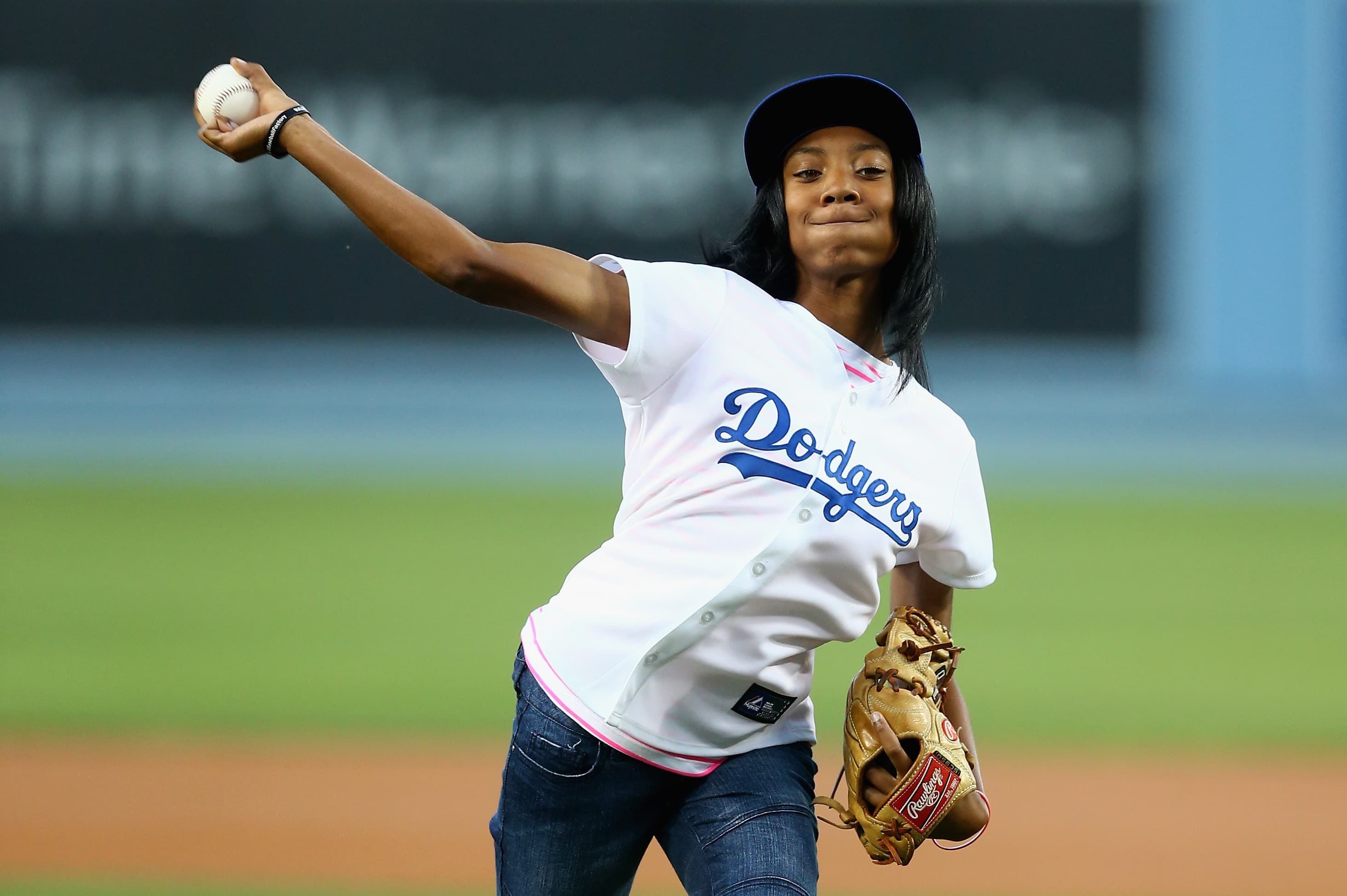
But despite that advice from the former President and First Lady, Mo’ne Davis, the best female Little League pitcher anyone had ever seen, quit her high school baseball team.
"Freshman year, I wasn’t pitching as much — what I wanted to do," Mo'ne says. "And I would always ask the coach, and he wouldn't ever give me a really good answer behind it. So then I was just like, ‘You know what, if I’m just going to be sitting here and not really doing anything, I might as well just try softball out.’ "
Mo’ne is happy with her decision. She says her softball teammates were great. There’s only one thing she didn’t enjoy about making the switch.
"Softball, they do a lot of cheering," Mo'ne says. "So that was kind of new to me. And I was like, ‘Can we not do that, like, singing?’ "
It’s been 75 years since the All-American Girls Professional Baseball League was founded — giving over 600 women the opportunity to play baseball and get paid for it.
And in the more than six decades since the league folded, generations of girls in this country have been pushed into playing softball instead of baseball.
"That really upsets these old bones, I’ll tell ya," Maybelle says. "I need WD-40 when I think about that."
Which is why Maybelle Blair, age 91, and Shirley Burkovich, age 85, are involved in an effort to build a center for women’s baseball in Rockford, Illinois, where the Rockford Peaches played. They travel the country, advocating for girls who want to play baseball.
"There’s nothing like baseball," Shirley says. "Nothing."
"And it would be so wonderful to have a league of their own and give these girls a chance," Maybelle says. "This is my goal before I get under the grass. As long as I’m this side of the grass, I’m going to be pushing it."
This segment aired on August 18, 2018.


